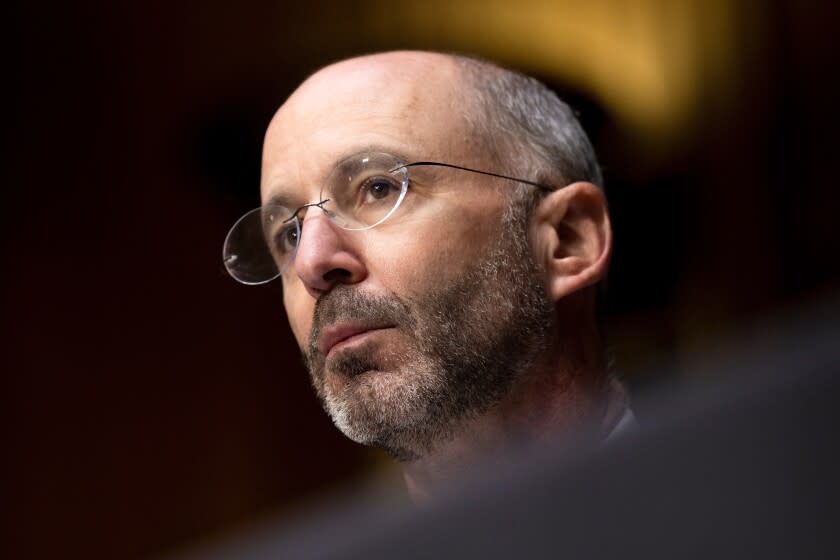After months of optimism, prospects for Iran nuclear deal 'tenuous' at best, U.S. says

It's only been a couple of months since U.S. and European officials said a renewal of the Iran nuclear deal was "imminent."
But with little progress since then, and a shifting global geopolitical scene, the top U.S. envoy for the Iran negotiations testified Wednesday that prospects for reviving the landmark deal were, "at best, tenuous."
"We do not have a deal," the Biden administration's special envoy for Iran, Robert Malley, told the Senate Foreign Relations Committee.
The deal, which was signed in 2015 by then-President Obama and the leaders of China, Russia, Britain, France and Germany, and ratified by the United Nations, limited Iran's ability to process uranium, forced it to get rid of heavy water, centrifuges and other potential nuclear products, and allowed international inspectors to enter Iran.
But President Trump withdrew from the deal in 2018, saying it hadn't gone far enough, and freeing Iran to ignore its obligations and ramp up production of materials that could eventually be used in making a nuclear bomb.
President Biden last year dispatched Malley and a team of negotiators to find a way for both the United States and Iran to return to the deal's requirements, which for Washington includes removing a number of economic sanctions that Trump stiffened to punish Tehran and that have devastated its economy.
In hotels in Vienna, multiple rounds of "indirect talks" ensued. The Iranians and the other signatories to the deal — the Europeans, Russia and China — negotiated face to face. Separately, Malley and his team awaited word from the Europeans on what transpired.
U.S. Secretary of State Antony J. Blinken expressed hopeful urgency, saying earlier this year that the "runway" to a renewed deal was getting shorter and shorter. Time was running out, he said, but a destination seemed clear.
As recently as late February and early March, even though the U.S. and Iranian representatives had never officially sat down together, more optimism was being expressed. Kamal Kharrazi, Iran's special representative to the talks, said an agreement was "imminent." He was echoed by officials of the European Union, hosts of the Vienna talks.
Josep Borrell, the foreign secretary for the EU, said in March that a "final text" was "essentially ready." EU negotiator Enrique Mora concurred, saying "almost everything is done." And in Washington, then-White House Press Secretary Jen Psaki said the sides were "getting closer."
But two issues threatened to scuttle the talks. Iran wants its Islamic Revolutionary Guard Corps, a militant branch of its armed forces that has been accused of attacks throughout the region, removed from the U.S. list of terrorist organizations. U.S. negotiators expressed willingness to do that — over significant opposition from congressional hawks — by saying the Revolutionary Guard would remain sanctioned through other means.
And then came Ukraine. After Russia invaded its neighbor on Feb. 24, Moscow's negotiators conditioned its agreement to a new nuclear accord on the U.S. and other Western powers removing sanctions they had placed on Russia as punishment for attacking Ukraine. Iran, a Moscow ally, also became reluctant to agree to a deal without the Kremlin's blessing. Blinken said the two issues were "irrelevant" to each other.
Malley said Wednesday that is where the talks have stalled. But he insisted at the highly critical hearing with both Democratic and Republican lawmakers that seeking a diplomatic resolution remained the best option for the United States. A military response as advocated by Israel and some others would at best slow down Iran, but not stop it in its nuclear pursuits, he said.
The Iran deal was never popular among many in Congress and in conservative Washington think tanks.
Any deal now would be "fatally flawed" and even weaker than the earlier version because of the advances Iran has made since Trump walked away, Mark Dubowitz of the conservative Foundation for Defense of Democracies testified to the Senate panel Wednesday.
"Iran’s nuclear program will leap forward like a jack-in-the-box," he said.
The International Atomic Energy Agency, the U.N.'s nuclear watchdog agency, said last week that Iran has amassed about 90 pounds of uranium enriched to 60% purity — a short, technical step away from weapons-grade levels.
This story originally appeared in Los Angeles Times.
